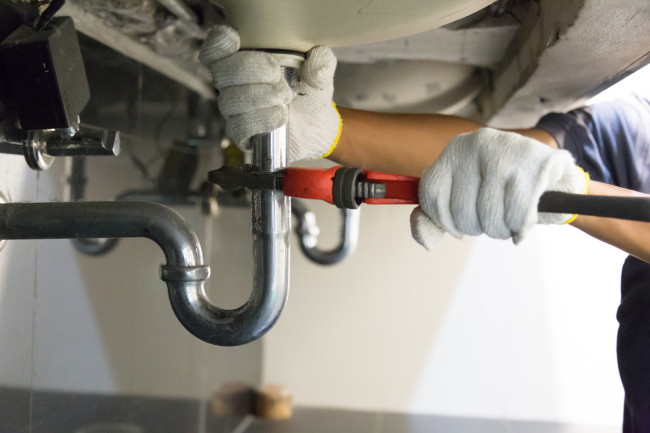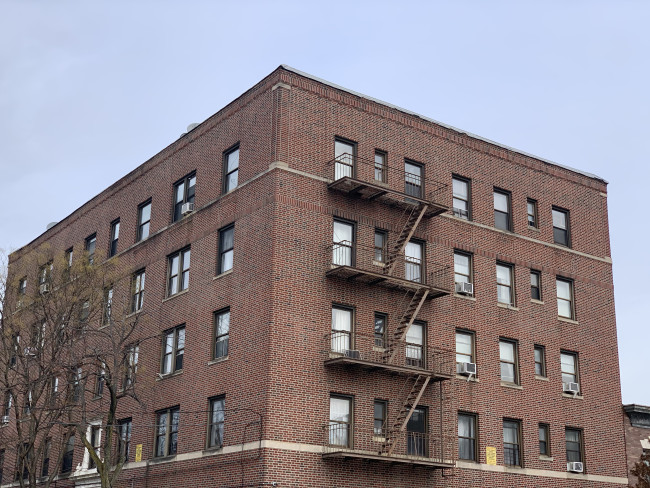How to research a landlord before you sign a lease
- Work with a reputable broker and check the building's common areas and amenity spaces
- Read renter reviews and see if there are complaints, violations, or a pattern of litigation
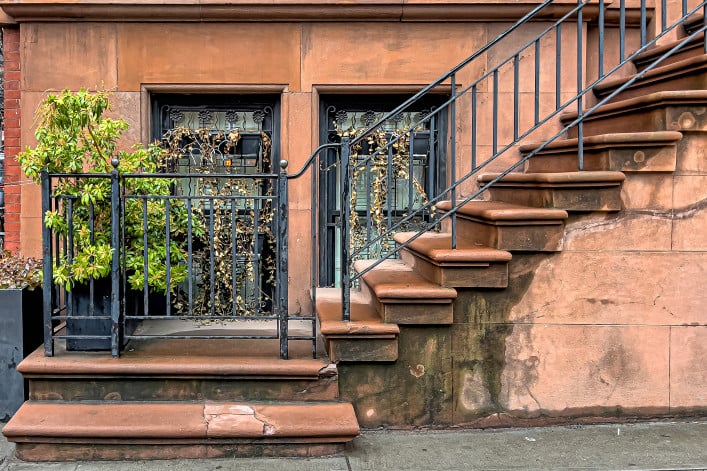
You can tell a lot about a landlord by looking at the building's condition.
iStock
It can be tough to know what kind of landlord you're getting before you sign a lease in New York City. Odds are you won't really find out whether you’ve landed a responsive owner or one that you need to pester for repairs until after you've moved in and need something fixed in your apartment. So how can you research a landlord ahead of time?
If you know what to look for, there are some tell-tale signs when you visit the building to tour the apartment—for example, clean, well-maintained common areas will give you a clue. Other ways of determining the quality of a landlord include speaking to tenants and working with a knowledgeable broker. You can also tap into a pretty deep well of valuable information by searching on public and private websites.
Read on for what you can (and should) do to glean essential intel on a landlord before you sign your next lease.
[Editor’s Note: An earlier version of this post was published in September 2022. We are presenting it again with updated information for July 2023.]
Check out the building's common areas
The condition of the building "speaks volumes," says Vicki Negron, a broker at Corcoran. If the building and premises are in immaculate condition, that’s a good sign the landlord cares about the building's upkeep. Negron says she has turned down listings in buildings "that just look terrible."
Trust your instincts. A broken stair might not be a major concern but small issues that aren’t quickly addressed can indicate a larger pattern of neglect. Consider how failing to fix a front door that fails to lock presents a security risk to tenants—and could result in your mailboxes being broken into and packages being stolen.
Besides the entrance and lobby, make an assessment of the laundry area, basement, and storage bins. How well-maintained (or not) those amenity spaces are will give you a clue about how the place is managed.
If you have an appointment with a broker to view an apartment, arrive an hour early to explore the surroundings. Better yet, attorney Steven Kirkpatrick, a partner at Romer Debbas, recommends visiting the building the evening before to check the place out.
"Walk around—is the garbage overflowing?" he asks. "The garbage may be cleaned up by the time of your appointment, but if the place is a mess, why should you think it will be clean when you move in?"
Looking for a landlord with a good reputation--and a rental agent you can trust? Put your search in the hands of The Agency, a tech-savvy real estate brokerage and Brick Underground partner. The Agency will charge a broker's fee of 10 percent of a year's rent instead of the usual 12 to 15 percent if the apartment is an "open" listing and you sign up here. Bonus: The agents at The Agency are a delight to deal with.
Search online for building violations
There are multiple online tools that can help you identify whether a building has complaints or violations. But first, it helps to know who owns it.
One way to source information is through NYC311 and the Department of Buildings websites. Tenants call 311 for service requests when your landlord isn’t responding, so the NYC311 portal allows you to see what kind of requests are being made. This is where you’d be able to identify noise complaints, among other problems.
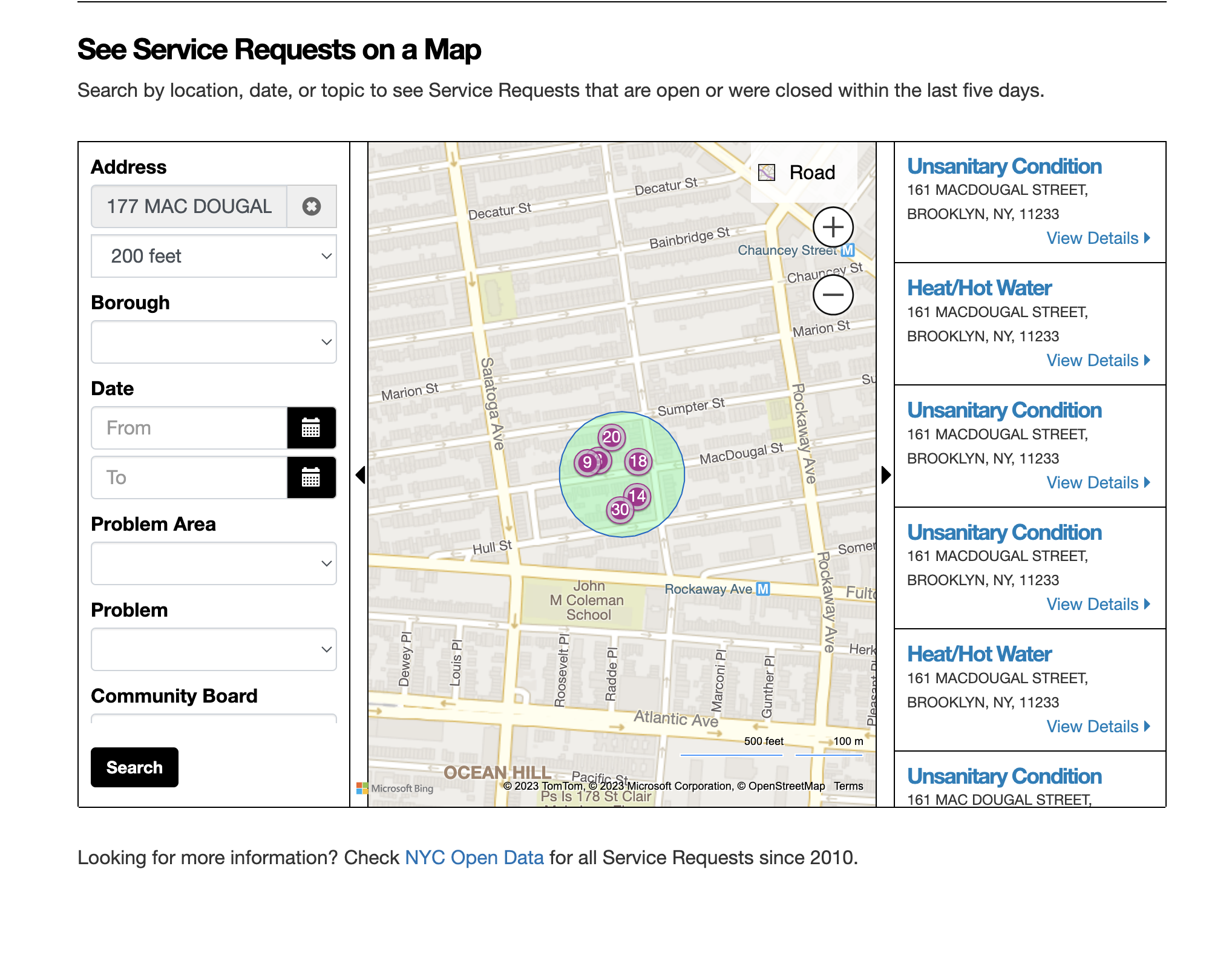
The DOB site cites violations for leaks, mold, heat, and hot water issues. Elevator violations are fairly common, but broken windows and doors are definitely a red flag. Heft’s building has dozens of violations and complaints—a warning of what was to come.
Housing Preservation and Development also provides building data and information about complaints and litigation, property registration, violations, and charges.
A building with very few violations is probably a well-run building and tenants are not calling the city out of frustration, Kirkpatrick says. "On the other hand, a building with many violations, and in particular recent ones, indicates that the landlord may not prioritize maintenance."
Another invaluable resource is Who Owns What in NYC created by the nonprofit JustFix, which is designed to help renters find the name of the actual landlord because many buildings hide behind "shell" companies—and avoid having to deal with aggravated tenants. So knowing the name of your landlord makes it much easier to research their history.
JustFix provides a helpful how-to guide, but it's a fairly simple process. Click "search" on the site and you’ll be able to enter your building’s address. Then you will see an overview of the building—the landlord's name, HPD (311) violations, and links to the HPD and DOB profiles.
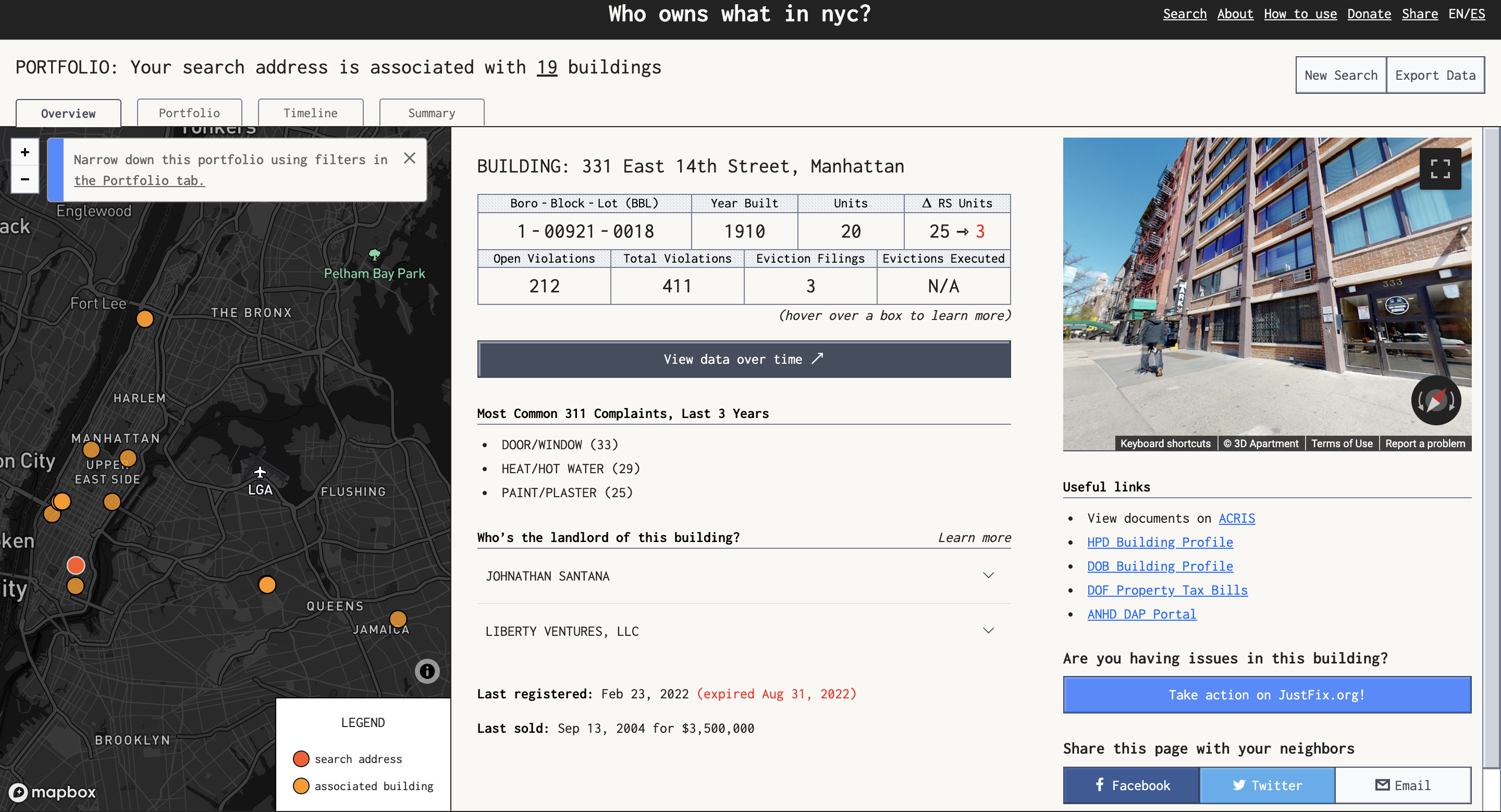
The "timeline" tab shows if the problems are seasonal or have ramped up in recent months. The "summary" page identifies the nature of the complaints, any code violations, the number of evictions, and the rent-stabilization status. Seeing a net loss of dozens of rent-stabilized apartments is a major red flag.
Who Owns What in NYC also gives information on other buildings owned by your landlord, which can show you if there is a pattern of problems.
Public information about building ownership is also available through the Automated City Register Information System, which you can access via New York City's Department of Finance. It's not an entirely straightforward search but can help you find out who is funding the mortgage and that can give clues about who is behind a limited liability corporation if that’s the building's ownership structure.
Look for building reviews
Once you identify the owner or managing agent associated with your building’s address, you can search these entities online and see what you come up with. If the landlord or management company has had any publicity, good or bad, it'll show up.
Another route is to search the address online and you might find a reference to the owner. You can also research your landlord via Yelp, which is a good way to find out what current or former tenants have to say. People are more likely to write reviews when they have something to gripe about, but at least you can see what sort of issues are being raised.
Check if your landlord is on the 100 Worst Landlords in NY Watchlist, a data-sharing tool to identify owners who are flouting the rules. Based on the most recent data, the biggest offenders are in Brooklyn and the Bronx. What's super helpful is that if a landlord is on the list, you can see all the other buildings they own—and avoid them.
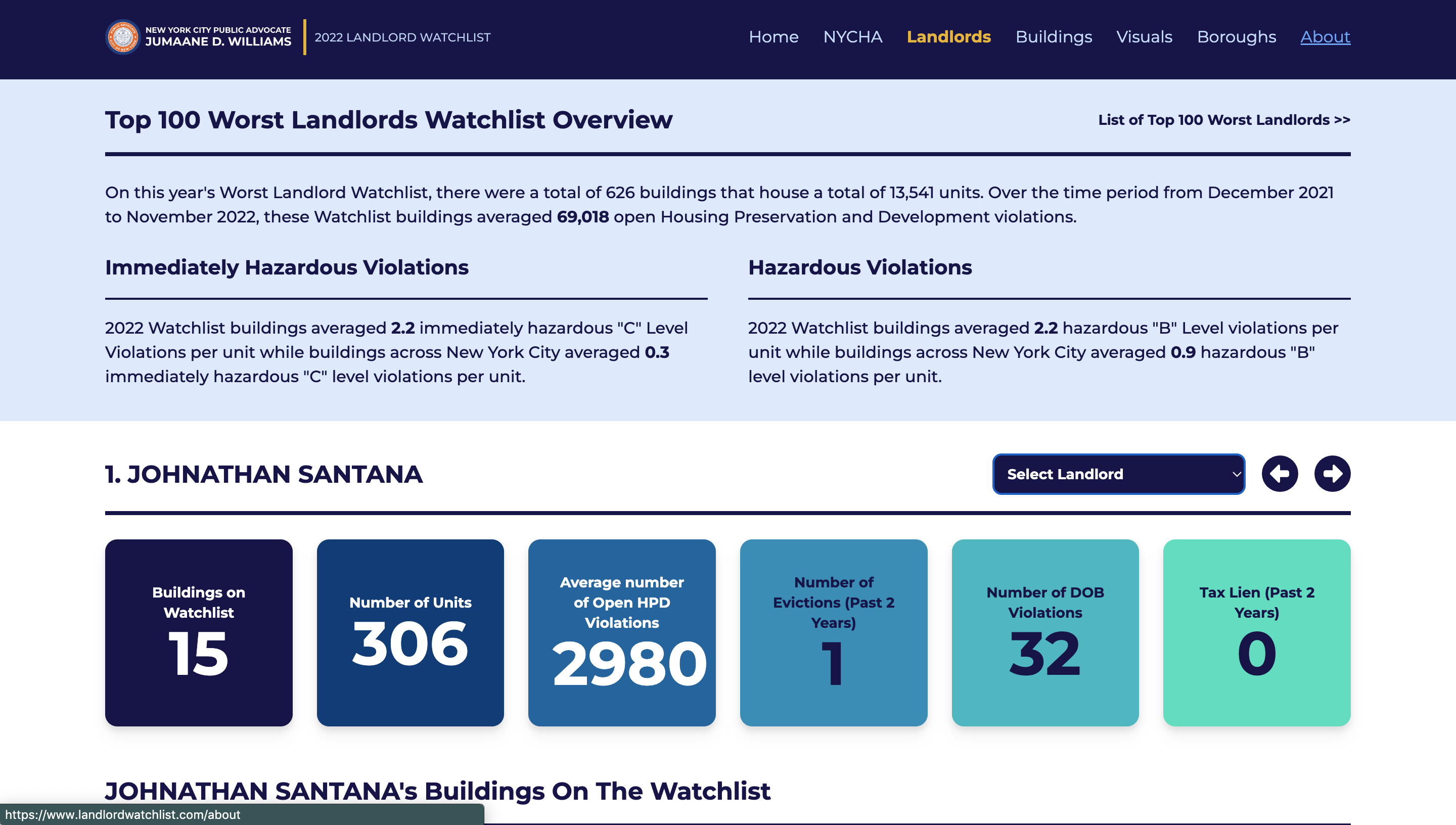
Apartment-review websites and apps offer intel from renters like yourself. Apartment Ratings, which is also a listing site, has been rating buildings since 2000. Openigloo is another listing platform that provides in-depth scorecards on the city's buildings. Both of these sites use city data to show open violations. GoHomeNY has over 4,000 renter reviews (but no listings or public data).
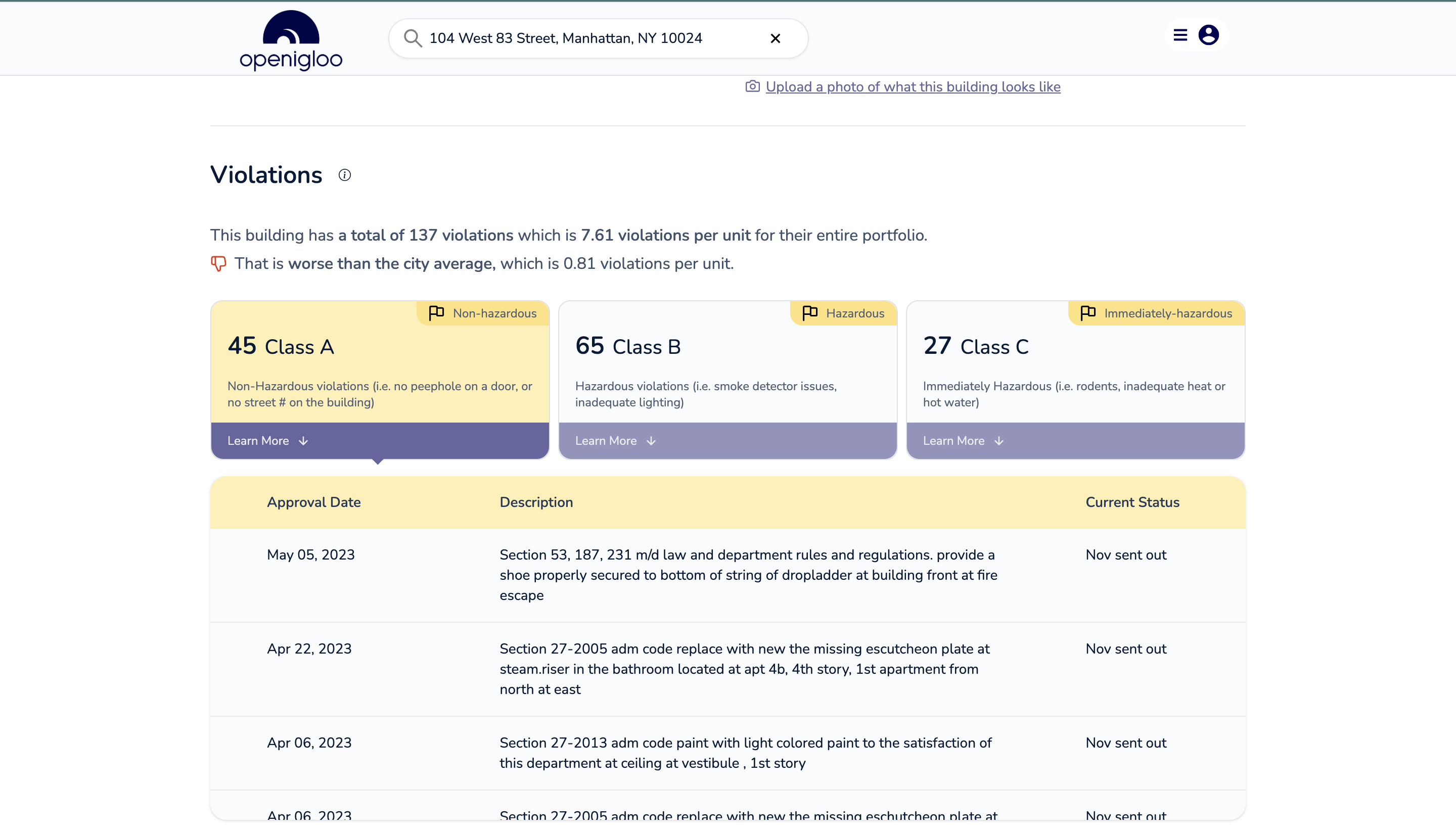
Get feedback from your broker
It sounds obvious, but working with a reputable broker can protect you from the worst of landlords. After all, if a landlord-tenant relationship goes south it's not just the landlord who bears the brunt of a tenant's anger, but the broker too. Negron says it is in a broker's interest to create the right "pairing" between a landlord and a renter. She encourages renters to ask their broker for details about the landlord.
"We do business with people of integrity and we have integrity so we want to match people in situations where they are going to live in quiet enjoyment," she says.
Some renters prefer buildings where the landlord is in residence, Negron says. There are always exceptions to the rule but in her experience, if the landlord lives in the same building, "tenants figure the place will be more likely to be landscaped, dry, and there will be no bugs," she says.
Speak to other renters
A broker isn't the only one who can give you information about the landlord. A departing tenant, or other renters in the building can answer your questions and may be the most reliable source of information. "If the tenants are there, ask them. They will give you the real skinny on what the landlord is like," Negron says.
Not everyone has the nerve to do it, but you can also chat with people in the building. Take a moment to tell people you’re thinking of moving in, and ask for the scoop on what it's like to live there.
You Might Also Like




















